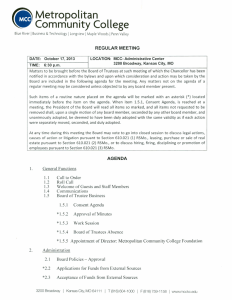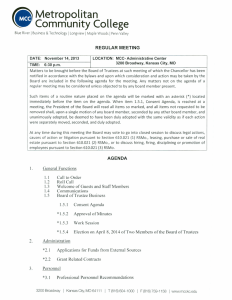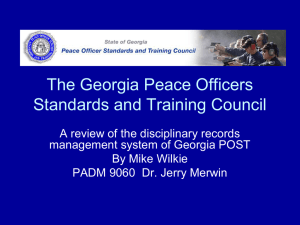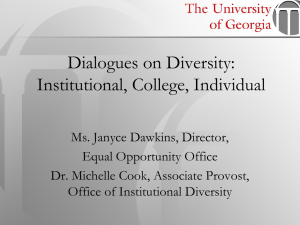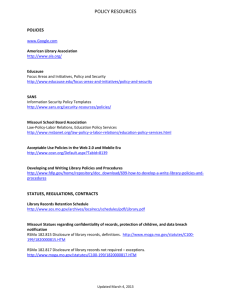Ferguson Commission 2014 Revision Powerpoint Presentation
advertisement
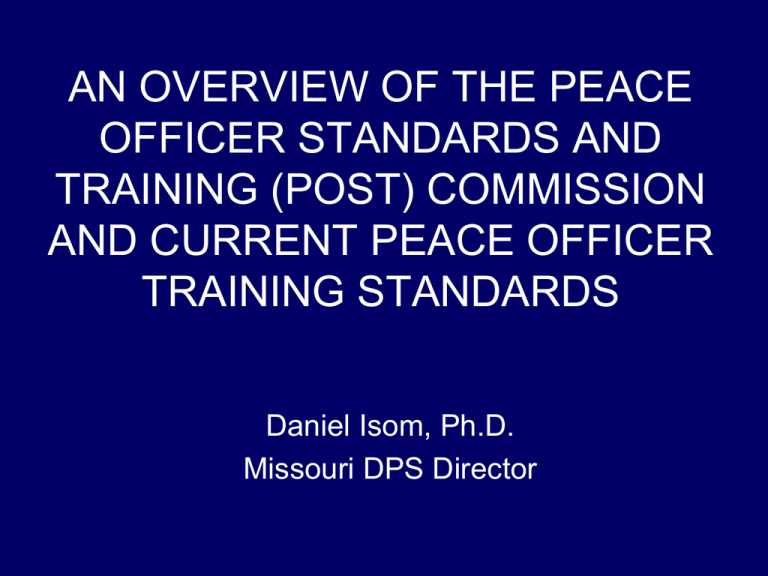
AN OVERVIEW OF THE PEACE OFFICER STANDARDS AND TRAINING (POST) COMMISSION AND CURRENT PEACE OFFICER TRAINING STANDARDS Daniel Isom, Ph.D. Missouri DPS Director Director of Public Safety Section 590.030.4 , RSMo, The director shall establish a procedure for obtaining a peace officer license and shall issue the proper license when the requirements of this chapter have been met. Section 590.050.4 , RSMo, The director may engage in any activity intended to further the professionalism of peace officers through training and education, including the provision of specialized training through the department of public safety. Director of Public Safety Pursuant to 11 CSR 75-1.010, the Director is responsible for the following: Establishing a classification system for peace officer licenses. Establishing minimum age, citizenship, and general education requirements for peace officers. Adopting or developing a Missouri Peace Officer License Exam (MPOLE). Director of Public Safety Providing for the licensing of peace officers possessing credentials from other states or jurisdictions. Establishing a procedure to obtain a peace officer license. Licensing and regulating peace officers. Licensing and regulating continuing education providers. Director of Public Safety Licensing and regulating training instructors and training centers. Establishing minimum standards for admittance into a basic training course. Promulgating rules pursuant to Chapter 590, RSMo. POST Commission The Missouri POST Commission is established pursuant to section 590.120, RSMo. All eleven members of the POST Commission are appointed by the Governor and confirmed by the Senate. Annually, the Director of Public Safety appoints one of the members as chairperson. POST Commission The POST Commission meets twice a year (April and October). A majority of the members shall constitute a quorum. Additionally, the POST Commission guides and advises the Director of DPS concerning his duties pursuant to Chapter 590, RSMo. POST Commission Of the eleven POST Commissioners, three are police chiefs, three are sheriffs, two are officers at the rank of sergeant or below, one is a state law enforcement official, one is a training center representative, and one is a public member. POST Commission Pursuant to 11 CSR 75-1.010, the POST Commission is responsible for the following: Establishing minimum standards for the basic training of peace officers. Establishing a procedure for the relicensing of peace officers whose licenses have expired. POST Commission Setting the minimum number of hours of basic training for peace officers. Providing for the recognition of basic training received at law enforcement training centers of other states, the military, the federal government, and territories of the United States. POST Commission Establishing requirements for the continuing education of peace officers. Administering the Peace Officer Standards and Training Fund. Peace Officer Basic Training As of July 1, 2007, all basic training centers deliver a minimum of 600 hours of basic training. Persons with 600 hours of basic training are eligible for a Class A Peace Officer License. Pursuant to section, 590.040.1, RSMo, the POST Commission cannot mandate more than 600 hours of basic training, with the exception of state law enforcement agencies, which must complete 1,000 hours of training. Peace Officer Basic Training Although capped at 600 hours of mandatory basic training, all basic training centers offer more than 600 hours of training. Training over the mandated 600 hours is considered “supplemental basic training”. May of the basic training centers offer near 1,000 hours of training, with some delivering over 1,200 hours of training. Peace Officer Basic Training With a few exceptions, to be eligible to be employed as a peace officer within St. Louis City, St. Louis County, St. Charles County, Jefferson County, and Jackson County, peace officers must have a valid Class A peace officer license, which is equivalent to 600 hours of basic training. This requirement has been in place for many years. However, as noted before, many of these officers have well over 600 hours of basic training. Peace Officer Basic Training Basic Training Curricula Chart (Handout) Continuing Education • • • • • • All licensed peace officers must obtain 48 hours of continuing education every three year reporting period. 4 hours Legal Studies 4 hours Technical Studies 4 hours Interpersonal Perspectives 4 hours Skill Development (firearms) 32 remaining hours in any above curricula areas 3 hours of “Racial Profiling” training (inclusive) Continuing Education • • • 24 of the 48 hours of continuing education training may be provided in-house by an employing law enforcement agency. “Racial Profiling” training may be presented inhouse by the employing agency, but the course must be pre-approved by POST before delivery as it has very specific learning objectives that must covered. Pursuant to 11 CSR 75-15.010, every peace officer with the authority to enforce motor vehicle or traffic laws shall obtain continuing education training regarding racial profiling. QUESTIONS? POST Program Contact Information The POST Program website will have all of the statutes and administrative rules we discussed: www.dps.mo.gov/post Main contact number for the POST Program within my office: 573-751-3409
